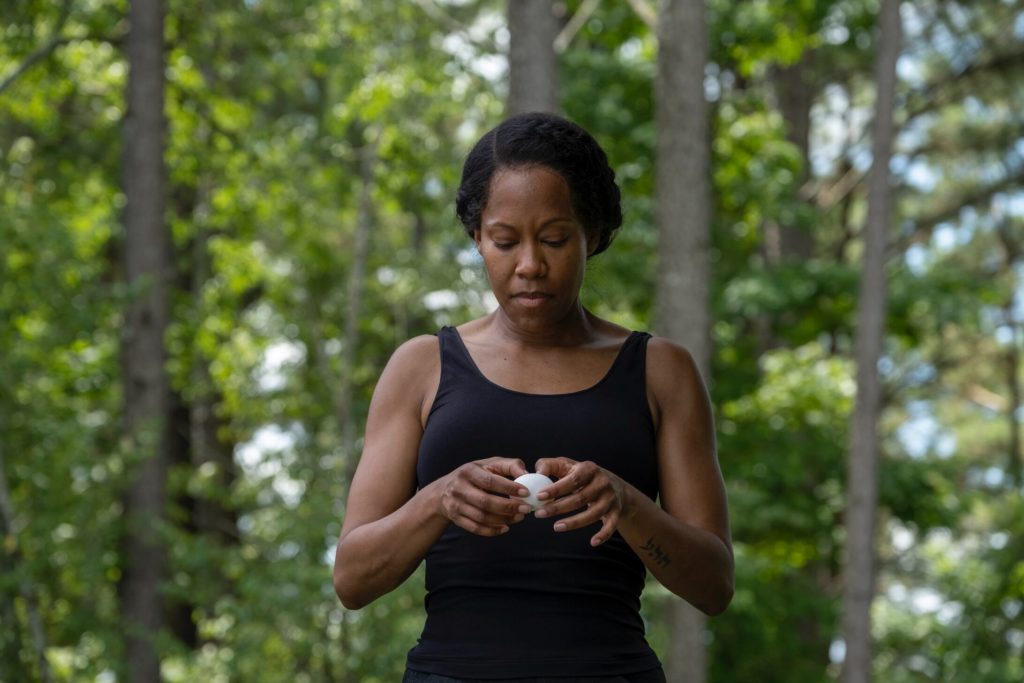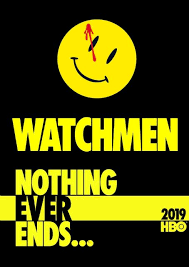Who Watches The Watchmen? Part Three: Episodes 7-9
By Chris M. Barkley:

Mr. Phillips: “Was I a worthy adversary, Master?”
Adrian Veidt: “No. But you put on one HELL of a show!”
- Episode 7: “An Almost Religious Awe,” Written by Stacy Osei-Kuffour and Claire Keichell, Directed by David Semel.
- Episode 8: “A God Walks into Abar,” Written by Damon Lindelof and Jeff Jensen, Directed by Nicole Kassell.
- Episode 9: “See How They Fly,” Written by Damon Lindelof and Nick Cuse, Directed by Frederick E.O. Toye.
*BEWARE SPOILERS*
In the beginning, there were good guys and bad guys. And all was well.
Until it wasn’t.
The good guy versus bad guy scenario could sustain the comics industry, and their readers, for only a relatively short period of time. Nowadays, the good-evil paradigm has been replaced by who lives or dies, whose ethics are in question, will the right thing be done or will the most pragmatic or expedient course be taken? How far can a hero, or a villain, be pushed in a story?
Have you ever stopped to think about who would ever want to be a superhero? To actually put on a mask, cowl or a cape? Or, conversely, would you have the nerve to do it yourself?
This is particularly pertinent question in a week that not only closes out HBO’s Watchmen miniseries, it also coincides with the momentous milestone of Superman publicly disclosing his Clark Kent identity, a decision that is not likely to be reversed anytime soon.
Alan Moore and Dave Gibbons Watchmen wasn’t the first comic book story to dabble in social injustice, heroic ambiguity or the psychological costs of double identities, but the storyline’s deconstruction of the superhero myths brought it to an entirely new and enthusiastic audience. Everyone who has ever been involved in the industry since its publication has recognized it as the gold standard of visual storytelling.
When Laurie Blake told Angela Abar back in Episode Three (“She Was Killed By Space Junk”) that people wanted to become masked vigilantes because of their unresolved issues with some deep, traumatic experience that they have never resolved, it was a moment resonated with me.
As a victim of many childhood traumas myself, I sometimes look back and marvel (no pun intended) at how I held onto my sanity, progressively healed and survived.
And while Laurie’s cynical observation is somewhat tainted by her own personal history of tragedy, it does, to a certain extent, ring true… .
But, let’s face it, what we’re really talking about here is a basic desire for wish fulfillment; to right wrongs and on some level, fight injustice. And ever since Stan Lee, Bill Everett, Jerry Siegel and Joe Shuster, Jack Kirby, Bill Finger, Gardner Fox and many others created the comics industry in the late 1930’s, many variations have been spun from their creations and mythologies.
The abandonment of Superman’s secret identity has been the latest in a long line of events and stunts solely created to keep readers involved, engaged and. most importantly, buying comics and graphic novels.
Damon Lindelof and company’s adaptation of Watchmen is a corporate extension this notion, a television event no one could have possibly imagined doing, a proto-sequel to one of the greatest graphic novels ever written. And while it’s too bad it was done at the expense of its original creator Alan Moore, I am very grateful that it turned out so magnificently.
After seeing Episode Nine of Watchmen, I can hardly wait to buy a DVD of this series to wallow in and unpack the details of how Damon Lindelof’s puzzle box of a story eventually comes together to form a perfect mosaic of ego, false entitlement, pride, desperation, faith and fate and, of course, love.
In addition, Watchmen is also an exciting, and paradoxically, meditative parable about how America has continually failed in reconciling its past injustices, racist acts and broken promises.
As a viewer, I found it immensely satisfying to watch all of these thematic threads of race, white privilege, cultural appropriation, class, revenge, arrogance and egotism and redemption play out.
Just the musical (and egg) references alone are worth a deep dive, as evidenced here in a (very spoilery) analysis by Jen Chaney at Vulture.com: “Let’s Talk About Watchmen’s Egg-cellent Finale”
In the first six episodes, we more-or- less wondered when Doctor Manhattan would show up. In Episode Seven, we found out he was right in front of us all along.
Besides the big reveal involving Angela (Regina King) and Cal Abar (Yahya Abdul-Mateen II) at the end of the episode, the most remarkable thing that happened was Laurie Blake’s (Jean Smart) boneheaded mistake. Since her first appearance she has repeatedly shown herself to be an almost preternaturally observant investigator and usually the smartest person in a three-mile radius. But her blunder, which ended up in her being captured by the Seventh Kalvary, was an attempt to reach out emotionally to a person central to the investigation. And while it advances the plot, it also reveals her to be as human and vulnerable as anyone else in the story.
Another admirable moment happened when Senator Joe Keene, Jr. (James Wolk) attempts to explain his nefarious plot, Laurie, who has obviously experienced this particular trope literally her entire life, cuts him off and says she doesn’t give a shit about his monologuing to her. While monologuing has been a standard (and WAY overused) tool to clue the audience into what may come next, it was refreshing to see it being rejected on screen here (AND in the finale as well).
Episode Eight was an acting showcase for both Regina King and Yahya Abdul-Mateen II and I expect both to be nominated for Emmys next year because of it. In this mostly timey-whimey set piece, we discover how Angela and Jon Osterman met a decade earlier in Saigon, experience the devastating deaths of her parents and grandmother, which, in turn, leads her to becoming a police officer in Vietnam and meeting and being initially wooed by a disguised Doctor Manhattan.
As often as he as been portrayed as aloof and omnipotent, the one boldest risks of the series was the decision to have him roll the dice and attempt to be human again. (But then again, he saw himself being in love with Angela, so he may have just been following the fate he saw for himself.) However, his ability to see the future, and be in several places in the time continuum at the same time, turns out to be his greatest power and his fatal flaw.
In the brief vignette with Adrian Veidt (Jeremy Irons), he finds himself on the wrong end of a kangaroo court trial with the “Game Warden” as the judge. When called upon to defend himself, Veidt rises from the defense table and gives one of the most unusual, and deliberately hilarious, defenses in the history of television.
Over the hour and nine minute finale, all of the narrative strands of our story come together and are pulled taut; Doctor Manhattan finds himself in imminent danger of being utterly destroyed by the Seventh Kalvary AND Lady Trieu, Adrian is freed from his virtual prison to be a spectator of the impending disaster, Will awaits to see his final act revenge comes to fruition and Angela, Laurie and Wade are helpless as they see the climax unfolding before them.
In the aftermath, Angela ponders the possibility of becoming Doctor Manhattan herself. And while she seemingly accepts the challenge, she, and the viewers, are left in suspense; has she gained his power or will something else happen?
“Considering what he could do, he could have done more,” her grandfather Will tells Angela, which is her impetus to take up the reins of power. Angela may have learned to look past putting on a mask to deal with her trauma, but is she seems to be ready for what happens next.
Because, at its very core, Watchmen is about power; who has it, who doesn’t, who thirsts for it, who dares to accept it and uses it responsibly.
Angela thinks she’s ready. I hope she is. And collectively, we should be rooting for her, too.
Because she is us.
“The time is always right to do what is right.”
Dr. Martin Luther King, Jr.

This column is Dedicated to Curtis Flowers, an African-American political prisoner who was freed on bail on December 16 after spending more than half of his life behind bars. Mr. Flowers was tried FIVE times for 1996 robbery in which four people were killed. Three of the convictions were thrown out due to prosecutorial misconduct by the district attorney who prosecuted him, Doug Evans, and two other trials resulted in hung juries. While his innocence is still in question at this point, the case against him has been found to be incredibly suspect by several independent investigations of the crime. I hope that the small measure of freedom he has been granted this week allows him the opportunity to see and enjoy Watchmen.
Discover more from File 770
Subscribe to get the latest posts to your email.

Schrodinger’s God: she either walks on water or there’s a big splash…